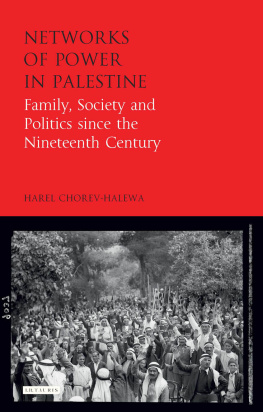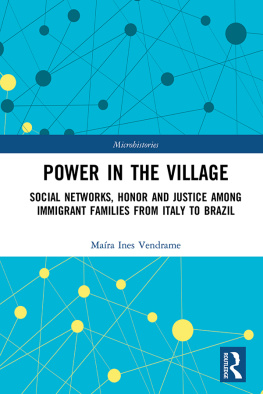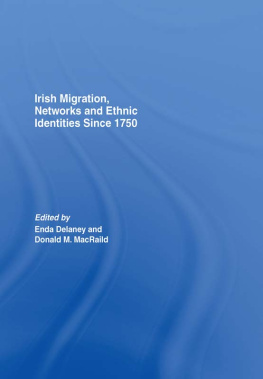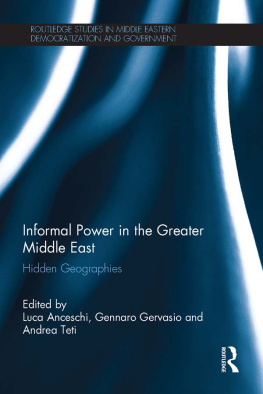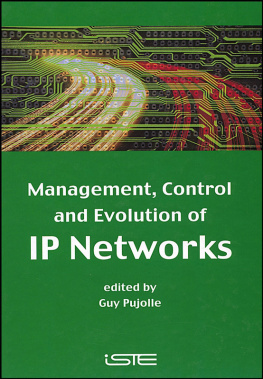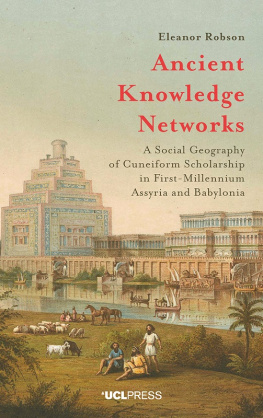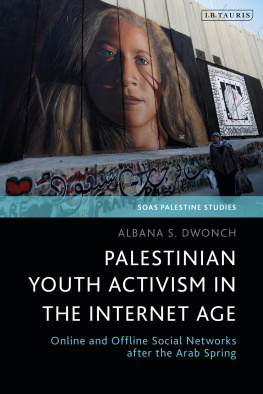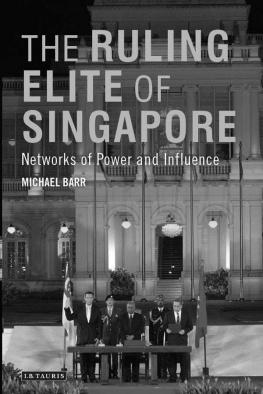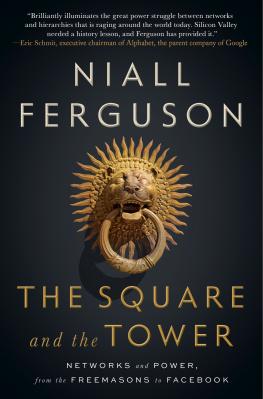
Harel Chorev-Halewa is head of the Middle Eastern Network Analysis Desk at the Moshe Dayan Centre for Middle Eastern and African Studies at Tel Aviv University. He is an expert on Network Theory and its application to Middle Eastern Studies, particularly Palestinian and Lebanese sociopolitical history. His studies have been published in the British Journal of Middle Eastern Studies, the Journal of Terrorism and Political Violence, and in Die Welt des Islams.

Published in 2019 by
I.B.Tauris & Co. Ltd
London New York
www.ibtauris.com
Copyright 2019 Harel Chorev-Halewa
The right of Harel Chorev-Halewa to be identified as the author of this
work has been asserted by the author in accordance with the Copyright,
Designs and Patents Act 1988.
All rights reserved. Except for brief quotations in a review, this book,
or any part thereof, may not be reproduced, stored in or introduced into a
retrieval system, or transmitted, in any form or by any means, electronic,
mechanical, photocopying, recording or otherwise, without the prior
written permission of the publisher.
Every attempt has been made to gain permission for the use of the images
in this book. Any omissions will be rectified in future editions.
References to websites were correct at the time of writing.
Library of Modern Middle East Studies 187
ISBN: 978 1 78453 381 6
eISBN: 978 1 78672 350 5
ePDF: 978 1 78673 350 4
A full CIP record for this book is available from the British Library
A full CIP record is available from the Library of Congress
Library of Congress Catalog Card Number: available
To my wife Michal and children Arbel, Yarden and Eilon
Contents
List of Illustrations
FIGURES
Jabari (front, second from the right) with the Hebron YMMA members, 1936.
A meeting of Mt. Hebron's notables with the Jerusalem District Governor, Edward Keith-Roach (center), Jabari on his right (courtesy of the Library of Congress).
The al-Masri safety matches factory, 1940 (courtesy of the Library of Congress).
Visit of Emir Abdullah in Hebron, 1936 (Jabari is second from the right).
DIAGRAMS
The Husayni Influence Network: 1920s early 1930s.
The Al-Jabari Network, 1967.
The Al-Masri Network, 1967.
The Al-Jabari Network, 1976.
The Al-Masri Network, 1976.
Acknowledgements
The study on which this book is based is the fruit of a decade of labor. Part of the research is based on my doctoral work at the Department of Modern History of the Middle East and Africa at Tel-Aviv University, one of the best, largest and most diverse departments for the study of the region and its history. Another part of the study was conducted within the Moshe Dayan Center for Middle Eastern and African Studies (MDC), the Tel Aviv University research institute where I head the Doron Halpern Middle Eastern Network Analysis Desk, which seeks to embed in historical research of the Middle East the Network Theory methodology, which I have also applied in this book. The final components of the study were completed during my post-doctoral term at the Center for International Studies and Research (CERI) of the Sciences Po University in France (the Paris Institute of Political Studies).
Throughout this decade I was privileged to learn from the best of teachers and colleagues, to whom I owe profound gratitude. Meir Litvak was a wise and dedicated doctoral advisor, whose ongoing superb academic guidance and reassurance saw me through my dissertation and work on this book. Uzi Rabi, director of the MDC, supported my academic path from the very beginning, and his contribution to the publication of this book and my other studies is invaluable, as has been that of the MDC, my academic home. I am also deeply thankful to Ehud Toledano for inspiring me to love the Ottoman era and recognize its importance in illuminating my Palestinian research topics, and for his profound insights and advice. My personal friends and outstanding colleagues Yoav Alon, Andrea L. Stanton, Avner Wishnitzer and Michael Milstein read the manuscript meticulously, and their keen observations were golden. Alain Dieckhoff, director of CERI at Sciences Po in Paris, sponsored me during my post-doctoral research, and I am grateful to him and to Bernard El-Ghoul, director of Sciences Po in Menton, for their gracious hospitality and constructive academic insights. My heartfelt thanks also go out to Itamar Rabinovich, president of the Israel Institute, to the Charles and Lynn Schusterman Family Foundation, and to Danny Scheck for the generous scholarship that allowed me to dedicate the time needed for this research.
Special thanks go out to Ephraim Lavie, Ifrah Zilberman, Basem Ajweh, Zvi Barel, Mahdi al-Masri, Mahdi Abd al-Hadi, Nabil al-Jabari, Adel al-Shrabati, Shalom Harari and Baruch Nagar, Rafe Jabari, and Itzik Magrafta who devoted time and energy to help me access the best sources a researcher can ask for. I am particularly grateful to my Palestinian friends and colleagues for their professional and candid support. In such politically loaded times and academic fields, this help is not for-granted, and proves that relations between Israelis and Palestinians are often more nuanced than is perceived from outside. This is especially true where sensitive sources are involved, such as those deep in the courts of sociopolitically powerful families, understandably guarded on matters of historical research and their modern-day reputation. A worthy historical study cannot shy away from criticism or unclothing details that may stir discomfort, whether justified or not. This point is particularly pertinent in the context of the Israeli-Palestinian conflict, which lends a contemporary interpretation to such historic narratives that is not necessarily forgiving of the original historic circumstances. As a historian, I must assume that historical figures are rarely immune to what may one day be perceived as mistakes, lapses and even injustices. It is my hope that I have observed this caveat with sensitivity and empathy throughout the book so as to present a comprehensive and nuanced historical narrative, and reflect facts that are complex rather than objectively bad or good. Contemporary judgment of historic circumstances aside, I am confident that this study of Palestinian history offers a valuable contribution to the existing body of research.
It is my pleasant duty to thank additional friends, colleagues and scholars who inspired and supported me throughout my work: Eyal Zisser, Joseph Kostiner, Michael Gilsenan, Hillel Frisch, Mahmoud Yazbak, Daniel Sobelman, Itamar Radai, Miri Sheffer, Amos Nadan, Ami Pedahzur, On Barak, Laetitia Bucaille, Ewa Kulesza, Jacky Hugi, and Nathalie and Charles Tenenbaum.
I owe special gratitude to the devoted editors of this book. Batsheva Sobelman, whose accord, friendship and professional advice made her a solid aide, to Chelsi Mueller for her sharp eye and index, as well as Maria Marsh, Sophie Rudland and Angelique Neumann, my pleasant and remarkably capable partners in producing the manuscript for I.B.Tauris. To my brother, the gifted graphic designer Erez Halewa, I am grateful for transforming numbers into the handsome diagrams to ease readers through the complex network relations detailed in the book.
Above all, I thank my family: my wife Michal, and our children Arbel, Yarden and Eilon, my sister Ilana and father Shlomo, and my late beloved mother, Irit. You are the force driving my academic endeavors, and the inspiration of my pursuits.
Next page
